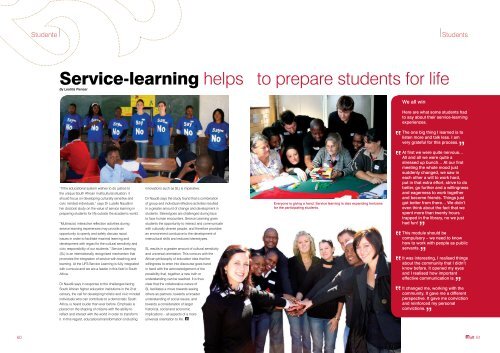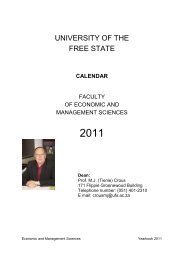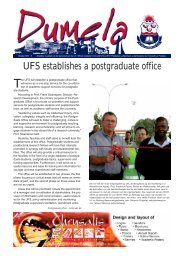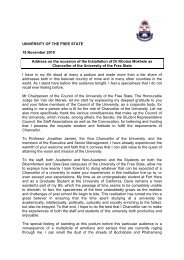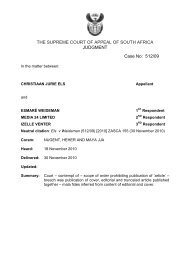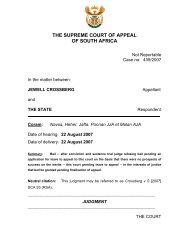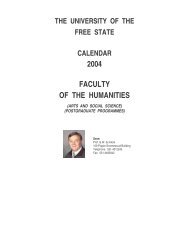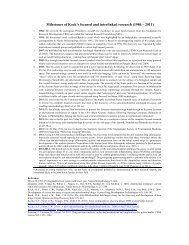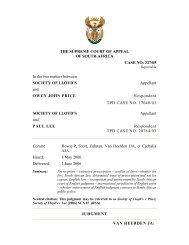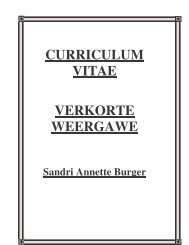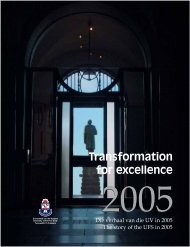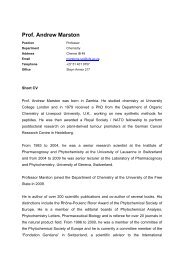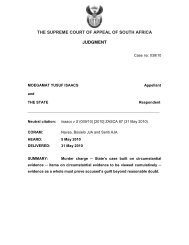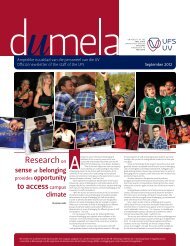Create successful ePaper yourself
Turn your PDF publications into a flip-book with our unique Google optimized e-Paper software.
Studente Students<br />
Service-learning helps to prepare students for life<br />
By Leatitia Pienaar<br />
“If <strong>the</strong> educational system wishes to do justice to<br />
<strong>the</strong> unique South African multicultural situation, it<br />
should focus on developing culturally sensitive and<br />
civic minded individuals,” says Dr Luzelle Naudé in<br />
her doctoral study on <strong>the</strong> value <strong>of</strong> service learning in<br />
preparing students for life outside <strong>the</strong> academic world.<br />
“Multiracial, interactive refl ection activities during<br />
service learning experiences may provide an<br />
opportunity to openly and safely discuss racial<br />
issues in order to facilitate maximal learning and<br />
development with regard to <strong>the</strong> cultural sensitivity and<br />
civic responsibility <strong>of</strong> our students.” Service Learning<br />
(SL) is an internationally recognised mechanism that<br />
promotes <strong>the</strong> integration <strong>of</strong> service with teaching and<br />
learning. At <strong>the</strong> UFS Service Learning is fully integrated<br />
with curricula and we are a leader in this fi eld in South<br />
Africa.<br />
Dr Naudé says in response to <strong>the</strong> challenges facing<br />
South African higher education institutions in <strong>the</strong> 21st<br />
century, <strong>the</strong> call for developing holistic and civic minded<br />
individuals who can contribute to a democratic South<br />
Africa, is heard louder than ever before. Emphasis is<br />
placed on <strong>the</strong> shaping <strong>of</strong> citizens with <strong>the</strong> ability to<br />
refl ect and interact with <strong>the</strong> world in order to transform<br />
it. In this regard, educational transformation (including<br />
innovations such as SL) is imperative.<br />
Dr Naudé says <strong>the</strong> study found that a combination<br />
<strong>of</strong> group and individual refl ective activities resulted<br />
in a greater amount <strong>of</strong> change and development in<br />
students. Stereotypes are challenged during face<br />
to face human encounters. Service Learning gives<br />
students <strong>the</strong> opportunity to interact and communicate<br />
with culturally diverse people, and <strong>the</strong>refore provides<br />
an environment conducive to <strong>the</strong> development <strong>of</strong><br />
intercultural skills and reduced stereotypes.<br />
SL results in a greater amount <strong>of</strong> cultural sensitivity<br />
and universal orientation. This concurs with <strong>the</strong><br />
African philosophy <strong>of</strong> education idea that <strong>the</strong><br />
willingness to enter into discourse goes hand<br />
in hand with <strong>the</strong> acknowledgement <strong>of</strong> <strong>the</strong><br />
possibility that, toge<strong>the</strong>r, a new truth or<br />
understanding can be reached. It is thus<br />
clear that <strong>the</strong> collaborative nature <strong>of</strong><br />
SL facilitates a move towards seeing<br />
o<strong>the</strong>rs as partners, towards a broader<br />
understanding <strong>of</strong> social issues, and<br />
towards a consideration <strong>of</strong> larger<br />
historical, social and economic<br />
implications – all aspects <strong>of</strong> a more<br />
universal orientation to life.<br />
Everyone is giving a hand. Service learning is also expanding horizons<br />
for <strong>the</strong> participating students.<br />
We all win<br />
Here are what some students had<br />
to say about <strong>the</strong>ir service-learning<br />
experiences.<br />
The one big thing I learned is to<br />
listen more and talk less. I am<br />
very grateful for this process.<br />
At first we were quite nervous…<br />
All and all we were quite a<br />
stressed up bunch… At our first<br />
meeting <strong>the</strong> whole mood just<br />
suddenly changed, we saw in<br />
each o<strong>the</strong>r a will to work hard,<br />
put in that extra effort, strive to do<br />
better, go fur<strong>the</strong>r and a willingness<br />
and eagerness to work toge<strong>the</strong>r<br />
and become friends. Things just<br />
got better from <strong>the</strong>re… We didn’t<br />
even think about <strong>the</strong> fact that we<br />
spent more than twenty hours<br />
trapped in <strong>the</strong> library, no we just<br />
had fun!<br />
This module should be<br />
compulsory – we need to know<br />
how to work with people as public<br />
servants.<br />
It was interesting, I realised things<br />
about <strong>the</strong> community that I didn’t<br />
know before. It opened my eyes<br />
and I realised how important<br />
effective communication is.<br />
It changed me, working with <strong>the</strong><br />
community. It gave me a different<br />
perspective. It gave me conviction<br />
and reinforced my personal<br />
convictions.<br />
60 <strong>Bult</strong> 61<br />
“<br />
“<br />
“<br />
“<br />
“<br />
“<br />
“<br />
“<br />
“<br />
“


